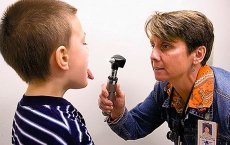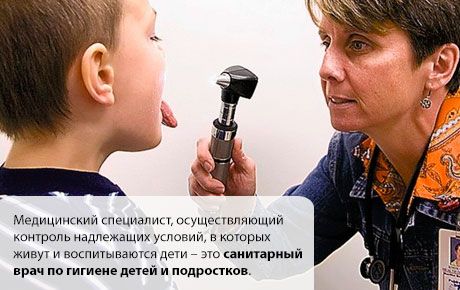Sanitary doctor for hygiene of children and adolescents
Last reviewed: 23.04.2024

All iLive content is medically reviewed or fact checked to ensure as much factual accuracy as possible.
We have strict sourcing guidelines and only link to reputable media sites, academic research institutions and, whenever possible, medically peer reviewed studies. Note that the numbers in parentheses ([1], [2], etc.) are clickable links to these studies.
If you feel that any of our content is inaccurate, out-of-date, or otherwise questionable, please select it and press Ctrl + Enter.

A medical specialist who monitors the proper conditions in which children live and is brought up is an ambulance doctor for the hygiene of children and adolescents.
Such a doctor is responsible for observing sanitary and preventive measures, which provide the most comfortable conditions for the healthy development of the child.
Who is a sanitary doctor for hygiene of children and adolescents?
The position of a sanitary doctor for children's hygiene implies control over compliance with the norms and conditions of residence, education, development and education in childhood and adolescence. Such a specialist works, as a rule, at a sanitary-epidemiological station.
The doctor determines the impact of unfavorable external factors on the development of the child, determines the degree of necessary hygienic standards for children, takes into account all the shortcomings that can interfere with the full mental and physical growth of the child.
The sanitary doctor must clearly know all the provisions of the current legislation in relation to the norms of the children's environment. To control compliance with these norms, there is a certain set of rules, stipulated in specially developed instructions and techniques.
A specialist of this profile has a full higher medical education and can work in any sanitary and epidemiological institutions, including state ones.
When should I go to a health doctor for hygiene of children and adolescents?
An appeal to a medical doctor may be due to the following reasons:
- the need for assessing the health status of children's territories and institutions;
- the available cases of negative impact of the environment and living conditions on children's health;
- the need for measures to improve the health of the child population;
- the need to provide statistical data on the incidence of children;

- organization of preventive measures;
- conducting sanitary surveys of institutions;
- assessment of the results of bacteriological and laboratory analysis;
- drawing up an act or protocol on violation of sanitary norms.
The sanitary doctor for hygiene of children and adolescents should help with all the forces and opportunities to improve the conditions of children's studies and recreation, to promote educational and informational conversations about the need to comply with the rules of personal and public hygiene.
What tests should I take when I go to a health doctor for hygiene of children and adolescents?
A visit to a sanitation specialist does not require the submission of any specific analyzes. If necessary, confirm or deny the existence of any pathological infectious focus, the specialist will independently conduct the necessary studies, based on epidemiological requirements.
What diagnostic methods is used by the sanitary doctor for hygiene of children and adolescents?
Methods for diagnosing sanitary norms are as follows:
- bacteriological method - requires the allocation of pure culture of a specific type of pathogen with subsequent identification. This study is conducted in several stages and lasts up to 2 days. Seed the selected material on a dense nutrient medium, examine sprouted colonies of bacteria, identify the pathogen with a test of sensitivity to antibacterial drugs;
- method of investigating metrological characteristics.
What does an ambulance doctor for children and adolescents do?
Specialist for the observance of sanitary norms and regulations must:
- ensure adequate sanitary standards in the premises and in the territories of pre-school and school education of children;
- to monitor the availability and hygienic condition of children's areas, play and sports grounds, rooms for classes;
- prevent and combat emerging environmental issues;
- pay attention to the observance of security measures in the period of study, mass children's events, children's leisure;
- take emergency measures that prevent the development and spread of mass infection of infectious and non-infectious diseases in institutions where children are located.
The sanitary doctor should have access to the sanitary-hygienic laboratory, and also conduct certain therapeutic, preventive and mass health measures among the children, and monitor their implementation.
The conclusion of a medical examination issued by such a specialist should be a reason for actions aimed at improving the conditions for older children and preschool children.
What diseases are treated by an ambulance hygiene in children and adolescents?
The sanitary doctor though has medical education, but does not deal with the treatment of specific diseases: his competence includes first and foremost the prevention of possible diseases. Such a specialist should not allow the spread of the outbreak among children of one institution, but, on the contrary, promote the full development and activity of children.
The work of a medical doctor implies greater seriousness and responsibility. Fighting the proliferation of infectious diseases, monitoring compliance with standards and standards of hygiene rules, and promoting the prevention of pathologies are the direct responsibilities of this specialist, thanks to which we can be calm for the health of our children.
The specialist in sanitary norms should be aware of hygiene, physiology, must perform the necessary studies and assess all the indicators of the child's condition. He also monitors compliance with the norms of physical activity, the influence of natural and chemical factors on the activities of children.
Councils of a Sanitary Doctor for Hygiene of Children and Adolescents
Hygiene issues are extremely important in the upbringing of the child. The participation of the school and parents in solving this problem is undeniable.
For the full development of the child, he should instill the necessary skills from childhood:
- observance of the regime of the day, distribution of time for study, rest, leisure, sleep;
- the development of useful habits such as morning washing, brushing teeth, washing hands before eating and after going to the toilet, etc .;
- strengthening the health of the child with the help of daily morning exercises, attending sports events, sections, active leisure activities;
- Promotion of rational extracurricular pastime (reading of scientific and cognitive literature, visiting recreational activities, lectures on hygiene);
- the need for summer rest, swimming in water, sunbathing, full-value vitamin nutrition.
The child needs to be explained that clean skin, pleasant body odor and neat clothes are the norm that must be observed for one's own health and attractiveness. These explanations must necessarily be confirmed by a personal example of parents and educators.
The sanitary doctor for hygiene of children and adolescents is not a very loud profession, but the importance of it is often underestimated. In the competence of this specialist - the health and the full future of our children.

 [
[